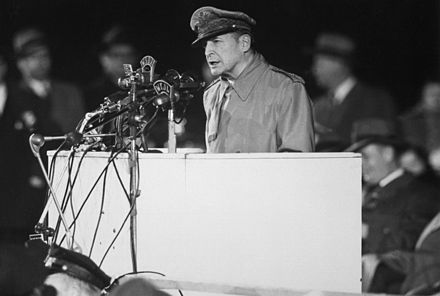1951
Truman fires MacArthur
“I fired him because he wouldn’t respect the authority of the President. I didn’t fire him because he was a dumb son of a bitch, although he was, but that’s not against the law for generals. If it was, half to three-quarters of them would be in jail.” This was the recollection of President Harry S Truman concerning the highly unpopular removal of General Douglas MacArthur from his position of the commander of the United Nations forces in the Korean War.
Douglas MacArthur was a controversial figure. He had commanded the American forces in the Philippines at the beginning of World War II but was extracted from the islands to safety in Australia just prior to their surrender. This was on orders from Washington which felt that the general was needed to lead the campaign in the Pacific rather than sit out the war in a prison camp. Though he was awarded the Medal of Honor for his escape, he was known by those he left behind to the mercies of the Japanese as “Bug-Out Doug.” At war’s end he supervised the American occupation of Japan and deserves credit for helping that country recover its economy and transition to democracy.
When North Korea invaded South Korea in 1950 it quickly overwhelmed the defenders and drove the American and allied forces deep into the south of the peninsula. Defeat looked certain until MacArthur ordered an extremely daring amphibious assault behind North Korean lines, which led to a Communist retreat. MacArthur’s forces pursued them north but as they approached the Yalu River, the Chinese army suddenly poured across the border and the U.N. Army was steadily forced south. At a meeting with Truman on Wake Island, MacArthur had not only upstaged the president but assured him that there would be no Chinese intervention.
At this time there was considerable talk about the use of nuclear weapons, and considerable unease at giving these bombs to MacArthur whose reputation for impetuous action was well-known. Moreover, MacArthur, never one to hide his light under a bushel, let it be known that he favoured an all-out war with China, something very few in Washington thought wise. Truman was in favour of relieving the general of his command but MacArthur’s enormous publicity machine and his standing in the eyes of the public made that dangerous politically. When it appeared that MacArthur was going behind Truman’s back in speaking to foreign governments and when he seemed to be trying to provoke China into a deeper conflict, Truman acted and ordered him home.
With deep regret I have concluded that General of the Army Douglas MacArthur is unable to give his wholehearted support to the policies of the United States Government and of the United Nations in matters pertaining to his official duties. In view of the specific responsibilities imposed upon me by the Constitution of the United States and the added responsibility which has been entrusted to me by the United Nations, I have decided that I must make a change of command in the Far East. I have, therefore, relieved General MacArthur of his commands and have designated Lt. Gen. Ridgway as his successor.
Full and vigorous debate on matters of national policy is a vital element in the constitutional system of our free democracy. It is fundamental, however, that military commanders must be governed by the policies and directives issued to them in the manner provided by our laws and Constitution. In time of crisis, this consideration is particularly compelling.
General MacArthur’s place in history as one of our greatest commanders is fully established. The Nation owes him a debt of gratitude for the distinguished and exceptional service which he has rendered his country in posts of great responsibility. For that reason I repeat my regret at the necessity for the action I feel compelled to take in his case.
The move backfired politically. Truman’s popularity sunk to the lowest level ever recorded by a president and MacArthur made a triumphal return.
